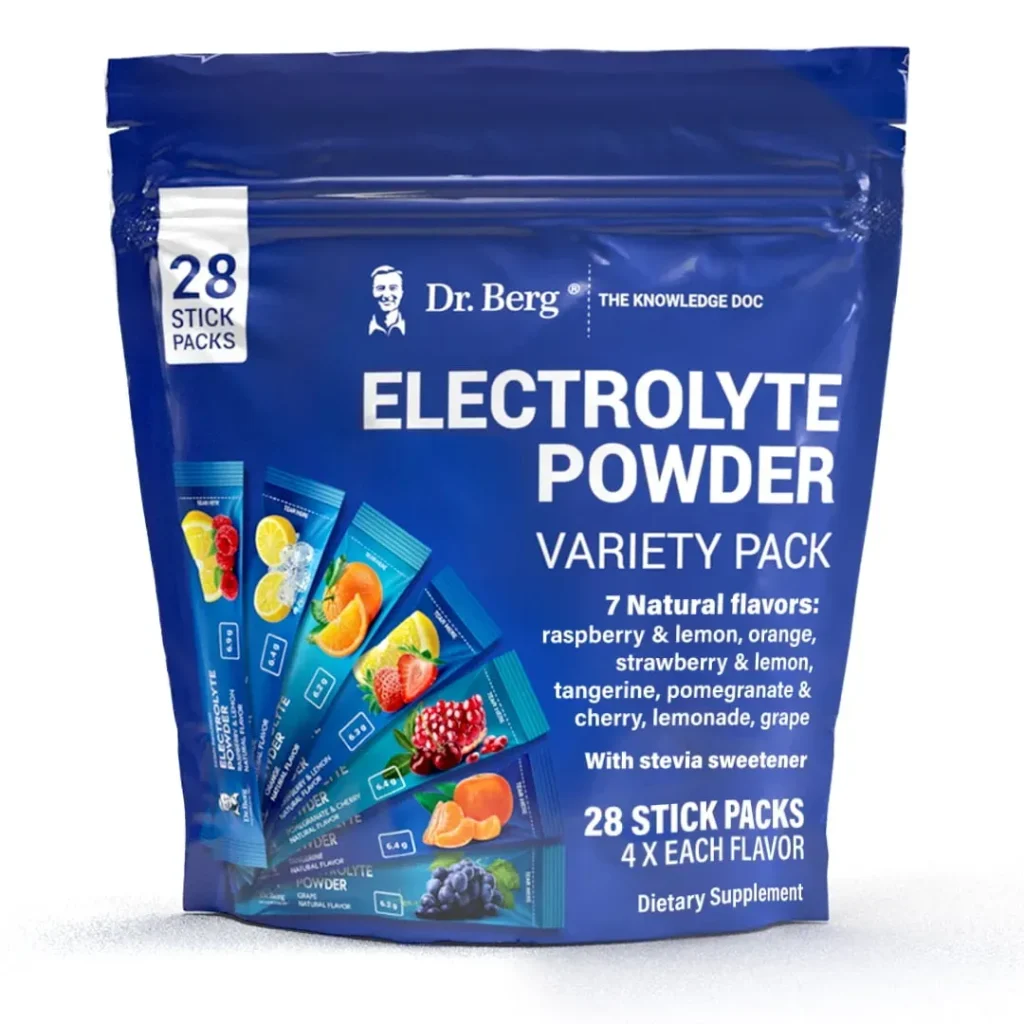Electrolyte powders have surged in popularity, with many claiming these products can help alleviate fatigue, improve hydration, and enhance overall performance during physical activities. These electrolyte supplements, which are designed to replenish essential minerals lost through sweat, play a crucial role in maintaining bodily functions and supporting peak hydration. With brands like Liquid I.V. gaining attention, consumers are increasingly curious about the benefits of electrolytes and whether these powders truly deliver on their promises. As hydration and performance become focal points for athletes and health enthusiasts alike, questions about the necessity of electrolyte drinks arise. Are electrolyte powders really a must-have for individuals, or are there more cost-effective alternatives that offer similar benefits?
Hydration essentials, often referred to as salt powders or electrolyte solutions, have become a hot topic among fitness aficionados and health-conscious individuals. These products aim to replenish vital minerals that your body needs for optimal functioning, especially after vigorous exercise or during hotter climates. As the market for these hydration aids continues to expand, many are exploring their advantages and whether such liquid electrolyte forms are necessary for everyday wellness. While exciting innovations appear, the debate remains on the overall efficacy and need for these powder mixes versus natural food sources. With so many choices available, potential consumers are left pondering which electrolyte formulation best meets their hydration needs.
Understanding Electrolyte Powders: Are They Worth It?
Electrolyte powders have gained immense popularity and are often marketed as essential supplements for hydration and overall wellness. However, the question remains—are they genuinely beneficial, or just a wellness trend? With the significant sales projections for the electrolyte powder market, it’s essential to unpack what these products actually provide, especially as many consumers may be unaware of their potential overhyped claims. Leading healthcare experts, like Dr. Elizabeth Klodas and Dr. David Goldfarb, express skepticism over electrolyte powders’ necessity, pointing out that the average person may not require these supplements for optimal hydration or energy levels.
Moreover, it’s essential to recognize that while electrolyte powders can offer minerals like sodium, potassium, and magnesium, these nutrients are readily available in whole foods. For instance, a simple banana provides a substantial amount of potassium alongside other vital nutrients, often at a fraction of the cost of a packet of electrolyte powder. Thus, incorporating a balanced diet rich in fruits, vegetables, and natural foods can often fulfill electrolyte needs without the additional expense associated with powdered supplements.
Key Benefits of Electrolyte Supplements for Active Individuals
For highly active individuals or athletes, electrolyte supplements can help replenish minerals lost through sweating and exertion, which is critical during intense workouts or in hot weather. Proponents of electrolyte powders argue that they facilitate better hydration and recovery after strenuous activities, potentially enhancing athletic performance. In situations where rapid rehydration is necessary, such as during prolonged exercise or extreme temperatures, electrolyte drinks can provide a more effective solution than water alone, helping maintain a proper fluid balance in the body.
However, it’s crucial to differentiate between necessity and marketing hype. As experts like personal trainer Natalya Alexeyenko suggest, many consumers might not need these supplements unless engaged in rigorous physical activity or experiencing significant fluid losses. For light to moderate exertion, plain water is often sufficient. Hence, understanding one’s hydration needs and the context in which electrolyte supplementation might be necessary is vital.
Liquid I.V. Review: A Closer Look at Popular Electrolyte Powders
Liquid I.V. is one of the most recognized brands in the electrolyte powder market, claiming to offer superior hydration through a patented delivery system that promotes faster absorption. Each serving contains substantial amounts of sodium and potassium, which might attract those looking for quick rehydration solutions. Yet, healthcare professionals like Dr. Klodas emphasize the importance of scrutinizing ingredient lists and nutritional information before choosing such products. Despite their marketing, some formulations could carry unnecessary additives and sugars that may not align with everyone’s health goals.
Moreover, as with any product, personal needs should dictate whether or not to incorporate Liquid I.V. or similar brands into your routine. If you engage in activities that lead to heavy sweating or require rapid electrolyte replenishment, they might justify their cost. However, for many individuals, a well-rounded diet and adequate water intake will sufficiently support hydration and electrolyte balance without resorting to these supplemental powders.
Hydration and Performance: The Role of Electrolytes
Electrolytes are crucial for maintaining hydration and ensuring proper muscle and nerve function. As our bodies lose water through sweat, the corresponding loss of electrolytes, particularly sodium and potassium, can lead to fatigue, muscle cramps, and impaired performance. For athletes and fitness enthusiasts, understanding the vital role these minerals play in hydration can inform their choices regarding electrolyte supplementation throughout their training and recovery phases.
It’s widely believed that a balanced intake of electrolytes can enhance physical performance, particularly under duress from heat or vigorous activity. However, this potential benefit underscores the importance of awareness around personal hydration needs and contexts where electrolyte supplementation might be warranted. By being mindful of when and how electrolytes are consumed, individuals can optimize hydration without falling into unhealthy dependency on powders marketed as essential for everyone.
The Necessity of Electrolyte Drinks: Myths and Facts
A common misconception is that electrolyte drinks are necessary for everyone, particularly those engaging in mild activities. However, experts suggest that for the vast majority of the population, especially those who do not engage in intensive training, the requirement for electrolyte supplements may be minimal. Proper hydration can often be achieved through adequate water intake along with a nutritious diet containing naturally occurring electrolytes.
Understanding this distinction is key to dispelling myths surrounding electrolyte drinks. Many marketing campaigns exaggerate the urgency of consuming these supplements, potentially misguiding consumers into believing they are essential for everyday hydration. For most individuals, particularly those whose activities do not induce significant sweat loss, water remains the best source for hydration without unnecessary additives and sugars.
Evaluating the Cost-effectiveness of Electrolyte Powders
Cost-effectiveness is another important consideration when evaluating the necessity of electrolyte powders. Many consumers might be surprised to find that the cost of a single packet can be upwards of $1.50, while natural sources of electrolytes can be found in everyday foods at a fraction of that cost. For instance, table salt, fruits like bananas, or even sports drinks at retail levels can supplement electrolyte needs much more economically.
Hence, determining whether to invest in electrolyte powders should weigh the potential benefits against the financial implications. For individuals who engage in regular, intensive exercise, such products may offer some advantages—but for the average person, prioritizing whole foods and traditional hydration methods may present a more prudent option without compromising health.
Nutritional Quality of Electrolyte Powders: What to Look For
When considering any electrolyte supplement, the nutritional quality of the product should be a primary concern. Many electrolyte powders contain additives, sweeteners, and artificial ingredients that could detract from their health benefits. Experts recommend looking for products with transparent ingredient lists, balanced electrolyte ratios, and minimal added sugars to ensure the best nutritional quality.
As consumers become more health-conscious, the demand for cleaner labels and natural products is increasing. Thus, individuals seeking electrolyte powders should educate themselves about what constitutes a healthy ingredient profile to avoid falling victim to heavily marketed but nutritionally poor products. This knowledge can empower consumers to make informed choices that align best with their wellness goals.
Electrolytes and Overall Health: More Than Just Hydration
While electrolytes are predominantly known for their role in hydration, their benefits extend beyond merely quenching thirst. Electrolytes like magnesium and calcium play critical roles in muscle contraction, nerve transmission, and metabolic processes. This broader perspective on electrolytes underlines their importance in maintaining overall health rather than viewing them solely as workout supplements.
Moreover, understanding how electrolytes interact with various bodily functions can help inform dietary choices. For instance, magnesium is vital for muscle recovery and energy production, while sodium helps maintain fluid balance during physical activity. Thus, being mindful of one’s electrolyte intake through both food and hydration can contribute to enhanced wellness in everyday life, not solely tied to athletic performance.
Future Trends in Electrolyte Powders: What to Expect
The landscape surrounding electrolyte powders is rapidly evolving, reflecting shifts in consumer preferences toward healthier, more natural options. As demand increases, brands are likely to innovate by creating cleaner formulas with fewer artificial ingredients, reflecting a growing awareness of health and wellness trends. This evolution may lead to the emergence of new products that prioritize nutritional quality while maintaining efficacy in hydration.
Furthermore, consumers may start to see more educational content accompanying the marketing of these products, aimed at helping individuals make more informed decisions about their hydration choices. This could pave the way for a more knowledgeable consumer base that values transparency and functionality in electrolyte supplements, ultimately reshaping the industry’s approach to marketing and product development in response to public demand.
Frequently Asked Questions
What are the benefits of electrolyte powders for hydration and performance?
Electrolyte powders can enhance hydration and performance by replenishing essential minerals lost during exercise or sweating. They support nerve function and muscle contraction, helping prevent fatigue and cramping. Additionally, they can improve fluid absorption when mixed with water, making hydration more effective than plain water alone.
Are electrolyte drinks necessary for everyone, or just athletes?
Electrolyte drinks, such as electrolyte powders, are especially beneficial for athletes or those engaging in intense or prolonged physical activity. However, for most people engaging in light exercise or regular daily activities, plain water is typically sufficient for hydration, and electrolyte powders may not be necessary.
What is Liquid I.V. and how does it compare to other electrolyte supplements?
Liquid I.V. is a popular brand of electrolyte powder that claims to provide better hydration than water alone by incorporating a blend of sodium, potassium, and sugars. It’s marketed for rapid hydration, especially during exercise or heat. Critics, like Dr. Klodas, argue that while it has marketing appeal, its benefits may not justify the cost compared to simpler alternatives like salt and fruits.
How do electrolyte powders help with fatigue and migraines?
Electrolyte powders can help mitigate fatigue and migraines by restoring the balance of essential minerals in the body, particularly sodium and potassium. A balanced electrolyte level is crucial for maintaining fluid balance and avoiding dehydration, which can trigger headaches and fatigue.
What ingredients should I look for in electrolyte powders?
When choosing an electrolyte powder, it’s essential to look for a clear ingredient list that offers a good balance of sodium, potassium, magnesium, and calcium, with minimal added sugars or artificial ingredients. Powders that avoid excessive sweeteners or fillers can be healthier options.
Can I get enough electrolytes from food instead of electrolyte powders?
Yes, a balanced diet rich in fruits, vegetables, nuts, and seeds can provide sufficient electrolytes. Foods like bananas, avocados, and spinach are excellent sources of potassium and other minerals. For most people, obtaining electrolytes from whole foods is preferable to using supplements like electrolyte powders.
How does sodium in electrolyte powders affect hydration?
Sodium is a crucial electrolyte that helps retain water in the body. Consuming electrolyte powders with sodium can enhance hydration by facilitating water absorption and preventing dehydration, especially during hot weather or intense physical activity.
Are there any downsides to using electrolyte powders?
Some downsides of electrolyte powders include high costs compared to simple foods or homemade solutions, potential additives like artificial sweeteners, and the risk of consuming excess sodium especially if you’re not very active. It’s essential to assess personal hydration needs and dietary sources before incorporating them into your routine.
How do electrolyte powders aid recovery after exercise?
Electrolyte powders aid recovery by replenishing vital minerals lost during sweat and supporting muscle function. They help restore fluid balance, reduce recovery time, and can help mitigate post-exercise fatigue, leading to improved performance in subsequent workouts.
Can electrolyte powders help with hangovers?
Yes, electrolyte powders can help alleviate hangover symptoms by rehydrating the body and replenishing electrolytes lost due to alcohol consumption. Sodium and potassium in these powders may assist in restoring proper fluid balance and reducing headache severity associated with hangovers.
| Key Point | Details |
|---|---|
| Definition of Electrolytes | Electrolytes are minerals that dissolve in water and create charged particles essential for bodily functions. |
| Common Electrolytes | Key electrolytes include sodium, potassium, calcium, magnesium, chloride, and bicarbonate. |
| Market Growth | Sales of electrolyte powders projected to reach $4.6 billion by 2030. |
| Expert Opinions | Dr. Elizabeth Klodas views electrolyte mixes as overpriced fads with unnecessary ingredients. |
| Concerns Over Ingredients | High sodium content and inclusion of sweeteners like allulose raise alarms about health impacts. |
| Alternatives to Powders | Natural sources like bananas or salt can provide necessary electrolytes effectively and cheaply. |
| Use Cases | Electrolyte powders may benefit those who sweat heavily or engage in extreme physical activity. |
Summary
Electrolyte powders are becoming increasingly popular as convenient solutions for hydration and recovery. However, the debate around their effectiveness reveals that while they can assist those in extreme physical situations, many individuals may not need these products. Experts like Dr. Elizabeth Klodas and personal trainer Natalya Alexeyenko suggest that natural food sources often provide adequate electrolytes without the added cost and artificial ingredients found in many commercial powders. Ultimately, while electrolyte powders have their place in nutrition, it is essential for consumers to assess their individual needs against the marketing claims.



